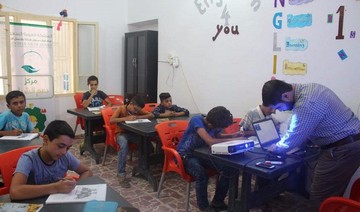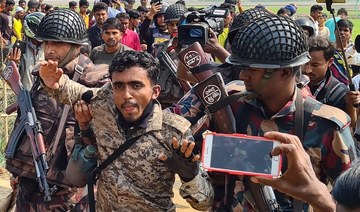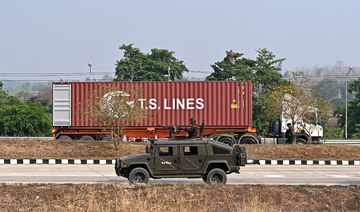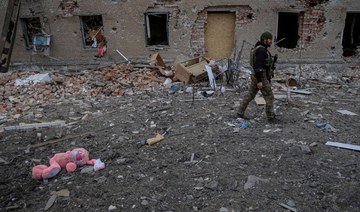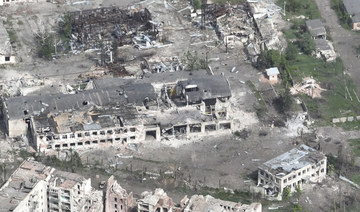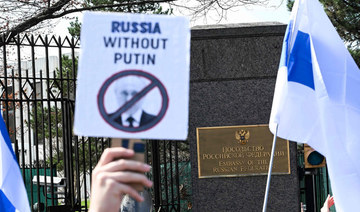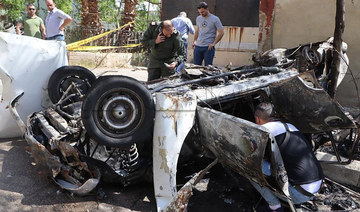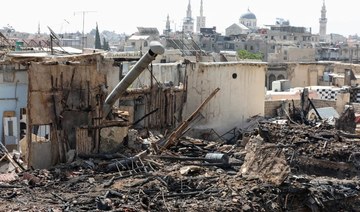JEDDAH: Saudi Arabia affirmed that it will continue working with the UN Children’s Fund (UNICEF) to achieve its 2023 strategic plan, which is based on four main priorities. These include early childhood development and child protection in cooperation with competent authorities in the Kingdom and the region.
This came in the Kingdom’s speech at the meetings of the second session of the executive board of UNICEF, which was delivered by First Secretary of the Saudi Arabia Mission to the UN in New York Mohammed bin Abdul Rahman Al-Qadi.
He paid tribute to Saudi Arabia for the sub-regional cooperation program in the GCC region and the efforts of UNICEF in Riyadh, and its contribution to strengthening the partnership between Saudi Arabia and UNICEF to implement many programs and plans for care of children and ensuring their rights.
The Kingdom is keen to provide all things that protect and care for all children and to ensure their enjoyment of their human, social, educational and economic rights.
Al-Qadi explained that the Kingdom will continue to provide everything that helps the organization to carry out its work and to use all the possibilities of its office in Riyadh to ensure that it does its work to the fullest and serve the common interests of Saudi Arabia and the GCC region.
Saudi Arabia continues work with UNICEF to achieve its 2023 strategic plan
Saudi Arabia continues work with UNICEF to achieve its 2023 strategic plan
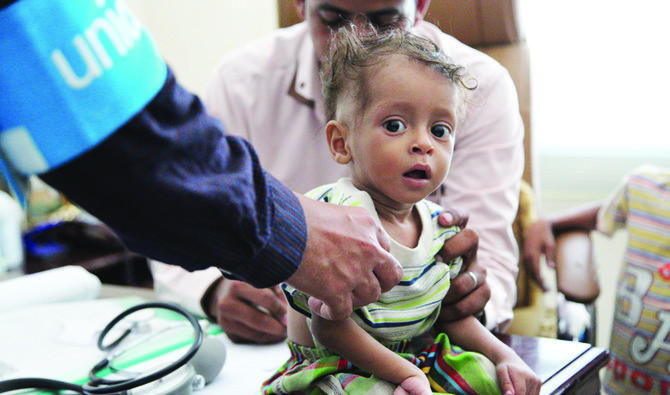
India deports Myanmar refugees who fled 2021 coup

- At least 38 refugees were deported on Thursday by the border state of Manipur
- ndia is not a signatory to the1951 UN Refugee Convention and has no law protecting refugees
GUWAHATI, India: India on Thursday deported the first group of Myanmar refugees who had sought shelter after a 2021 military coup, a top state minister said, following weeks of efforts that were hampered by fighting between Myanmar’s rebel forces and the ruling junta.
Thousands of civilians and hundreds of troops from Myanmar have crossed the border to India after the coup. This has worried New Delhi, which has announced plans to fence its border with Myanmar and end a visa-free movement policy.
At least 38 refugees were deported on Thursday by the border state of Manipur, which plans send back a total of 77 people as it copes with sporadic violence that has killed at least 220 people since ethnic clashes broke out in May last year.
“Without any discrimination, we have completed the first phase of deportation of illegal immigrants from Myanmar,” Manipur Chief Minister N. Biren Singh said in a social media post. “The state government is continuing the identification of illegal immigrants.”
One Indian national was also repatriated by Myanmar, Singh added.
New Delhi has not signed the 1951 UN Refugee Convention, which spells out refugee rights and states’ responsibilities to protect them, and it does not have its own laws protecting refugees.
Singh, who is from Prime Minister Narendra Modi’s Bharatiya Janata Party, said in March deportations had begun, but Indian security officials said the efforts were held up by fighting in Myanmar.
Modi is seeking a rare third straight term in ongoing national elections and his government has blamed the refugee influx as one reason for violence that has roiled Manipur.
Britain’s foreign secretary, in Kyiv, promises Ukraine aid for ‘as long as it takes’

- Cameron said Ukraine had a right to use the weapons provided by London to strike targets inside Russia
- 8 children injured in Russian strikes in Kharkiv region amid Cameron's visit
KYIV: British Foreign Secretary David Cameron promised three billion pounds ($3.74 billion) of annual military aid for Ukraine for “as long as it takes” on Thursday, adding that London had no objection to the weapons being used inside Russia.
“We will give three billion pounds every year for as long as is necessary. We’ve just really emptied all we can in terms of giving equipment,” he told Reuters in an interview on a visit to in Kyiv, adding that the aid package was the largest from the UK so far.
“Some of that (equipment) is actually arriving in Ukraine today, while I’m here,” he said.
Cameron said Ukraine had a right to use the weapons provided by London to strike targets inside Russia, and that it was up to Kyiv whether to do so.
“Ukraine has that right. Just as Russia is striking inside Ukraine, you can quite understand why Ukraine feels the need to make sure it’s defending itself,” Cameron told Reuters outside St. Michael’s Cathedral.
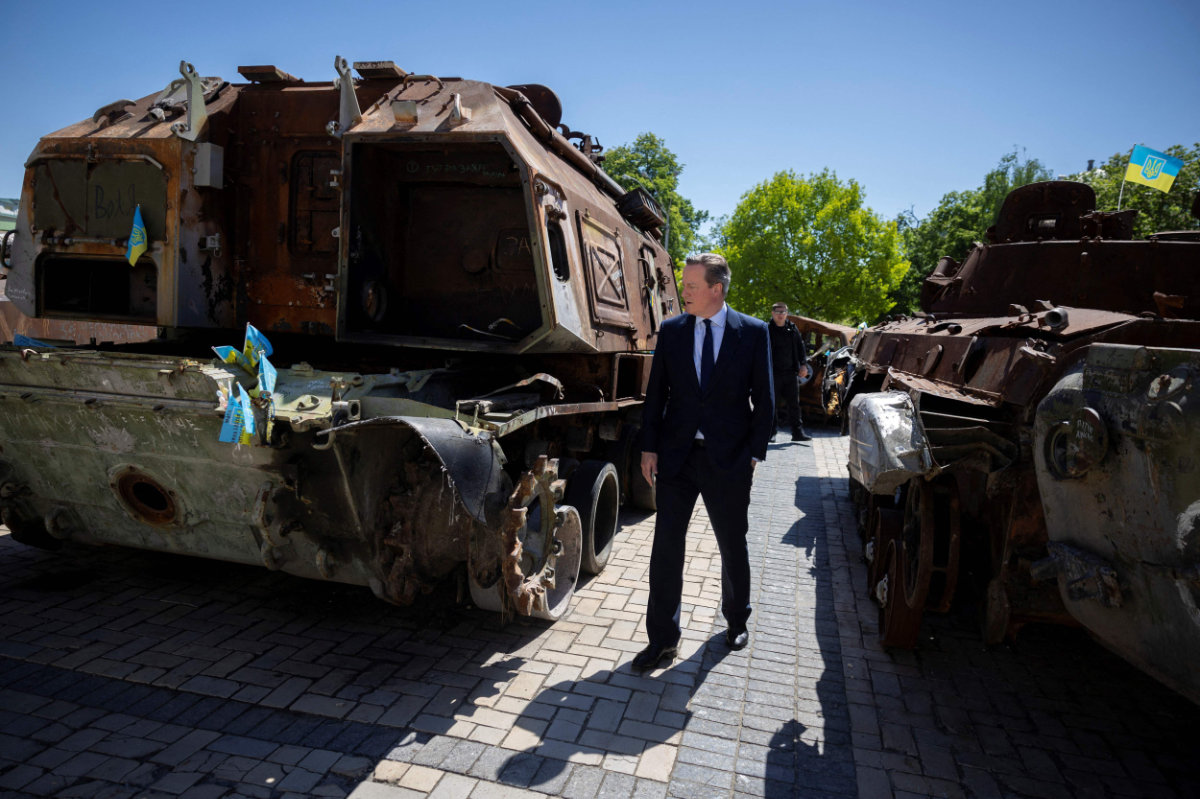
Cameron, who led the UK from 2010 and 2016 as prime minister and only returned to frontline politics several months ago, met Ukraine’s Foreign Minister Dmytro Kuleba and President Volodymyr Zelensky on his second visit to Kyiv as foreign secretary.
Britain’s top diplomat celebrated the release of a long-delayed $60 billion aid package by the US Congress.
“It’s absolutely crucial, not just in terms of the weapons it will bring, but also the boost to morale that it will bring to people here in Ukraine.”
Cameron did not answer directly when asked how he thought the possible re-election of Republican frontrunner Donald Trump to the White House could affect US support for Ukraine.
Trump and hard-line Republicans in Congress oppose further aid to Ukraine, with the possible exception of a loan.
“It’s not for us to decide who the Americans choose as their president — we will work with whoever that is,” Cameron said, adding that the strategy for Ukraine’s allies ought to be to ensure Ukraine is on the front foot by the time of the US elections in November.
Cameron met Ukraine’s FM Dmytro Kuleba and President Volodymyr Zelensky on his second visit to Kyiv as foreign secretary
Britain’s top diplomat celebrated the release of a long-delayed $60 billion aid package by the US Congress.
Russian strike injures 8 children
While Cameron was in Ukraine, Russian guided bombs struck a site close to a sports complex in Ukraine's northeastern Kharkiv region, injuring at least eight children, local officials said.
The town of Derhachi where the incident occurred is a frequent target of Russian aerial strikes. Police said the bombs had landed on premises near the sports centre, sparking fires.
"The air raid siren didn't sound, there was no siren at all," Yana Korobets, head of the sports complex, told Reuters Television.
"I was outside when... I heard a missile fly by. I understood it landed behind our sports complex. It blew out the windows, and because the children are barefoot in our class they suffered cuts in their legs and their hands."
Debris from shattered glass was strewn about the complex. Blood stains were spattered on a wall and on the floor. Outside, the ground was pocked with large craters.
Four of the children suffered moderate injuries and the others minor ones, regional governor Oleh Synehubov said on the Telegram messaging app. An elderly man was also wounded.
"The consequences could have been more tragic," Synehubov told national TV.
Derhachi is near the border with Russia. The Kharkiv region where it is located has long been targeted by Russian attacks but the strikes have become more intense in recent months, hitting civilian and energy infrastructure.
Moscow denies deliberately targeting civilians but thousands have been killed and injured in the war that began with the full-scale invasion of Moscow troops in February 2022.
Russia shipping fuel to North Korea above UN cap, says US
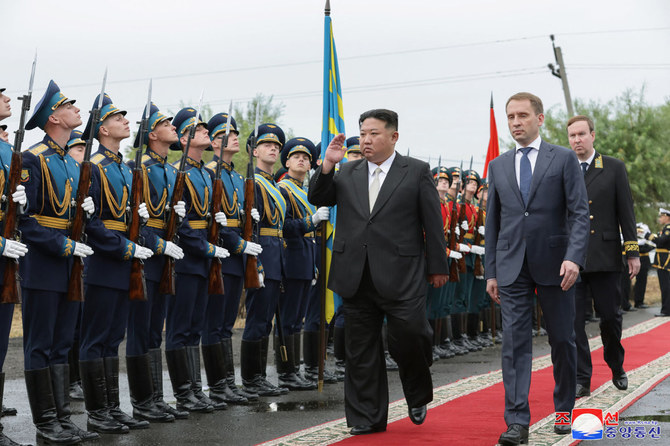
- Under UN sanctions, Pyongyang is limited to importing 500,000 barrels of refined products a year
- Last March, the US and South Korea in March launched a task force aimed at preventing North Korea from procuring illicit oil
WASHINGTON: Russia has been quietly shipping refined petroleum to North Korea at levels that appear to violate a cap imposed by the United Nations Security Council, the White House said on Thursday, with new sanctions to come soon in response.
The disclosure came on the first day after a UN panel of experts monitoring enforcement of longstanding UN sanctions against North Korea for its nuclear weapons and missile programs was disbanded after a Russian veto.
“At the same time that Moscow vetoed the panel’s mandate renewal, Russia has been shipping refined petroleum from Port Vostochny to the DPRK (North Korea),” White House national security spokesperson John Kirby told reporters.
Under UN sanctions, Pyongyang is limited to importing 500,000 barrels of refined products a year. The Russian and North Korean UN missions in New York did not immediately respond to a request for comment on the US accusation.
Kirby said that in March alone, Russia shipped more than 165,000 barrels of refined petroleum to North Korea and that given the close proximity of Russian and North Korean commercial ports, Russia could sustain these shipments indefinitely.
Russia blocked the annual renewal of the UN sanctions monitors in late March in what a US official described as a calculated move by Moscow to hide its own violations of UN Security Council resolutions.
Kirby said the United States will continue to impose sanctions “against those working to facilitate arms and refined petroleum transfers between Russia and the DPRK.” North Korea is formally known as the Democratic People’s Republic of Korea.
“We have previously worked to coordinate autonomous sanctions designations with our partners — including Australia, the European Union, Japan, New Zealand, the Republic of Korea, and the United Kingdom — and we will continue to do so,” he said.
State Department spokesperson Matt Miller said the United States and its allies are working to announce “new coordinated sanctions designations this month.”
The US and South Korea in March launched a task force aimed at preventing North Korea from procuring illicit oil.
The US and others have also accused North Korea of transferring weapons to Russia for use against Ukraine, which it invaded in February 2022. Both Moscow and Pyongyang deny the accusations, but vowed last year to deepen military relations.
The debris from a missile that landed in the Ukrainian city of Kharkiv on Jan. 2 was from a North Korean Hwasong-11 series ballistic missile, UN sanctions monitors told a Security Council committee in a report seen by Reuters on Monday.
Syria says Israeli strike outside Damascus injures eight troops
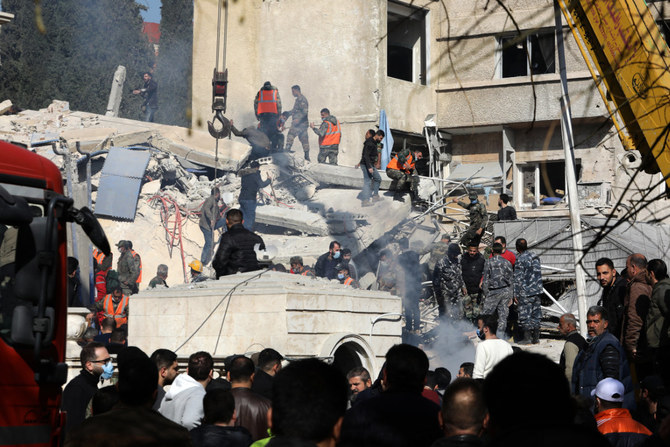
- A security source said the strike hit a building operated by government forces
- Defense ministry acknowledged only that the strike caused some material damage
An Israeli airstrike on the outskirts of Damascus injured eight Syrian military personnel late on Thursday, the Syrian defense ministry said, the latest such attack amid the war in Gaza.
The Israeli strike, launched from the occupied Golan Heights toward “one of the sites in the vicinity of Damascus,” caused some material damage, the Syrian defense ministry said in a statement.
The strike hit a building operated by Syrian security forces, a security source in the alliance backing Syria’s government earlier told Reuters.
The Israeli military said it does not comment on reports in the foreign media.
Israel has for years been striking Iran-linked targets in Syria and has stepped up its campaign in the war-torn country since Oct. 7, when Iran-backed Palestinian militants Hamas crossed into Israeli territory in an attack that left 1,200 people dead and led to more than 250 taken hostage.
Israel responded with a land, air and sea assault on the Gaza Strip, escalated strikes on Syria and exchanged fire with Lebanese armed group Hezbollah across Lebanon’s southern border.
The security source said the location struck in Syria on Thursday sat just south of the Sayyeda Zeinab shrine, where Hezbollah and Iranian forces are entrenched.
But the source said the site struck was not operated by Iranian units or Hezbollah.
US media experts demand review of New York Times story on sexual violence by Hamas on Oct. 7
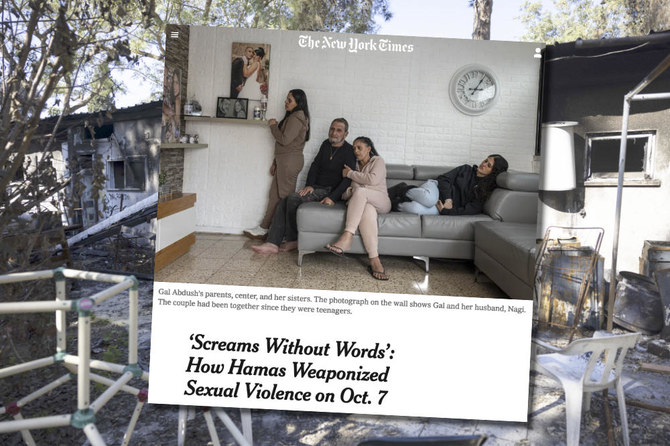
- 64 American journalism professionals sign letter accusing the newspaper of failing to do enough to investigate and confirm the evidence supporting the allegations in its story
- It concerns a story headlined ‘Screams Without Words: Sexual Violence on Oct. 7’ that ran on the front page of the newspaper on Dec. 28
CHICAGO: Sixty-four American journalism professionals signed a letter sent to New York Times bosses expressing concern about a story published by the newspaper that accused Palestinians of sexual violence against Israeli civilians during the Oct. 7 attacks.
It concerns a story headlined “Screams Without Words: Sexual Violence on Oct. 7” that ran on the front page of the newspaper on Dec. 28 last year.
In the letter, addressed to Arthur G. Sulzberger, chairperson of The New York Times Co., and copied to executive editors Joseph Kahn and Philip Pan, the journalism professionals, who included Christians, Muslims and Jews, demanded an “external review” of the story.
It is one of several news reports by various media organizations that have been used by the Israeli government to counter criticisms of the brutal nature of its near-seven-month military response to the Hamas attacks, during which more than 34,000 Palestinians have been killed and most of the homes, businesses, schools, mosques, churches and hospitals in Gaza have been destroyed, displacing more than a million people, many of whom now face famine.
The letter, a copy of which was obtained by Arab News, states that “The Times’ editorial leadership … remains silent on important and troubling questions raised about its reporting and editorial processes.”
It continues: “We believe this inaction is not only harming The Times itself, it also actively endangers journalists, including American reporters working in conflict zones, as well as Palestinian journalists (of which, the Committee to Protect Journalists reports, around 100 have been killed in this conflict so far).”
Shahan Mufti, a journalism professor at the University of Richmond, a former war correspondent and one of the organizers of the letter, told Arab News that The New York Times failed to do enough to investigate and confirm the evidence supporting the allegations in its story.
“The problem is the New York Times is no longer responding to criticism and is no longer admitting when it is making mistakes,” he said. The newspaper is one of most influential publications in the US, he noted, and its stories are republished by smaller newspapers across the country.
This week, the Israeli government released a documentary, produced by pro-Israel activist Sheryl Sandberg, called “Screams Before Silence,” which it said “reveals the horrendous sexual violence inflicted by Hamas on Oct. 7.” It includes interviews with “survivors from the Nova Festival and Israeli communities, sharing their harrowing stories” and “never-before-heard eyewitness accounts from released hostages, survivors and first responders.”
In promotional materials distributed by Israeli consulates in the US, the producers of the documentary said: “During the attacks at the Nova Music Festival and other Israeli towns, women and girls suffered rape, assault and mutilation. Released hostages have revealed that Israeli captives in Gaza have also been sexually assaulted.”
Critics have accused mainstream media organizations of repeating unverified allegations made by the Israeli government and pro-Israel activists about sexual violence on Oct. 7, with some alleging it is a deliberate attempt to fuel anti-Palestinian sentiment in the US and help justify Israel’s military response.
Some suggest such stories have empowered police and security officials in several parts of the US to crack down on pro-Palestinian demonstrations, denouncing the protesters as “antisemitic” even though some of them are Jewish.
New York Mayor Eric Adams, for example, asserted, without offering evidence, that recent protests by students on college campuses against the war in Gaza had been “orchestrated” by “outside agitators.”
Israeli Prime Minister Benjamin Netanyahu has said the protests against his country’s military campaign in Gaza are antisemitic in nature.
Jeff Cohen, a retired associate professor of journalism at Roy H. Park School of Communications at Ithaca College, told Arab News The New York Times story was “flawed” but has had “a major impact in generating support for Israeli vengeance” in Gaza.
He continued: “Israeli vengeance has claimed the lives of tens of thousands of civilians. That’s why so many professors of journalism and media are calling for an independent investigation of what went wrong.
“That (New York Times) story, along with other dubious or exaggerated news reports — such as the fable about Hamas ‘beheading babies’ that President Biden promoted — have inflamed war fever.”
Cohen said the US media “too often … have promoted fables aimed at inflaming war fever,” citing as an example reports in 1990 that Iraqi soldiers had removed babies from incubators after their invasion of Kuwait. The assertions helped frame anti-Iraqi public opinion but years later they were proved to be “a hoax,” he added.
“On Oct. 7, Hamas committed horrible atrocities against civilians and it is still holding civilian hostages,” Cohen said. “Journalists must tell the truth about that, without minimizing or exaggerating, as they must tell the truth about the far more horrible Israeli crimes against Palestinian civilians.
“The problem is that the mainstream US news media have a long-standing pro-Israel bias. That bias has been proven in study after study. Further proof came from a recently leaked New York Times internal memo of words that its reporters were instructed to avoid — words like ‘Palestine’ (‘except in very rare cases’), ‘occupied territories’ (say ‘Gaza, the West Bank, etc.’) and ‘refugee camps’ (‘refer to them as neighborhoods, or areas’).”
Mufti, the University of Richmond journalism professor, said belligerents “on both sides” are trying to spin and spread their messages. But he accused Israeli authorities in particular of manipulating and censoring media coverage, including through the targeted killing of independent journalists, among them Palestinians and Arabs, and said this was having the greatest impact among the American public.
“Broadly speaking, a lot of the Western news media, and most of the world news media, do not have access to the reality in Gaza,” he said. “They don’t know. It is all guesswork.
“They are all reporting from Tel Aviv, they are reporting from Hebron, they are reporting from the West Bank. Nobody actually knows what the war looks like. It is all secondhand information.
“Most of the information is coming through the Israeli authorities, government and military. So, of course, the information that is coming out about this war is all filtered through the lens of Israel, and the military and the government.”
Mufti said the story published by The New York Times “probably changed the course, or at least influenced the course, of the war.”
He said it appeared at a time when US President Joe Biden was pushing to end the Israeli military campaign in Gaza “and it entirely changed the conversation. It was a very consequential story. And it so happens it was rushed out and it had holes in it … and it changed the course of the war.”
Mohammed Bazzi, an associate professor with the Arthur L. Carter Journalism Institute at New York University, told Arab News the letter demanding an “external review” of the story is “a simple ask.”
He added: “This story, and others as well, did play a role” in allowing the Israeli military to take action beyond acceptable military practices “and dehumanize Palestinians.” Such dehumanization was on display before Oct. 7, Bazzi said.
“In the Western media there seemed to be far less sympathetic coverage of Palestinians in Israel’s war in Gaza as a consequence of these stories,” he continued.
“We have seen much less profiles of Palestinians … we are beyond 34,000 Palestinians killed but we don’t have a true number or the true scale of the destruction in Gaza — there could be thousands more dead under the rubble and thousands more who will die through famine and malnutrition. This will not stop, as a consequence of what Israel has done.”
Bazzi said the Western media has contributed to the dehumanization of Palestinians more than any other section of the international media, while at the same time humanizing the Israeli victims.
“The New York Times has a great influence on the US media as a whole and sets a standard” for stories and narratives that other media follow, which is “more pro-Israel and less sympathetic to Palestinians,” he added.
Bazzi, among others, said The New York Times has addressed “only a handful of many questions” about its story and needs to do more to present a more accurate account of what happened on Oct. 7.
The letter to New York Times bosses states: “Some of the most troubling questions hovering over the (Dec. 28) story relate to the freelancers who reported a great deal of it, especially Anat Schwartz, who appears to have had no prior daily news-reporting experience before her bylines in The Times.”
Schwartz is described as an Israeli “filmmaker and former air force intelligence official.”
Adam Sella, another apparently inexperienced freelancer who shared the byline on the story, is reportedly the nephew of Schwartz’s partner. The only New York Times staff reporter with a byline on the story was Jeffrey Gettleman.
Media scrutiny of the story revealed that “Schwartz and Sella did the vast majority of the ground reporting, while Gettleman focused on the framing and writing,” according to the letter.
The New York Times did not immediately respond to requests by Arab News for comment.



